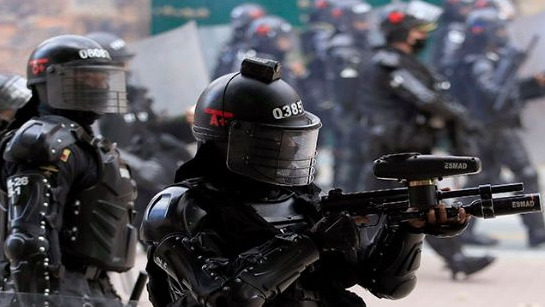
IACHR says Colombian military used excessive force against protesters
Bogota, July 7 (RHC)-- The Colombian government used “excessive and disproportionate” force during mass protests earlier this year, the Inter-American Commission on Human Rights (IACHR) said in a long-awaited report released on Wednesday.
The IACHR, an autonomous body in the Organization of American States, called on the South American nation to make structural changes to its militarised police force, which has been accused of committing “egregious” abuses against protesters.
“The response of the state was characterised by an excessive and disproportionate use of force, in many cases, including lethal force,” IACHR President Antonia Urrejola said during a press conference.
The protests, known as the Paro Nacional, erupted in April as a pushback against a controversial tax reform bill and inequalities caused by the pandemic. After the largely peaceful demonstrations resulted in a harsh crackdown by police forces, the protests quickly expanded into a reaction to state violence, gripping the South American country for months.
Human Rights Watch has confirmed that 34 people – largely protesters and civilian bystanders – were killed during the protests. Other activist organizations put that death count even higher.
Human rights violations included sexual abuse by riot police, forced disappearances and many injuries, which prompted the visit of the human rights panel in early June.
The highly critical IACHR report followed a detailed investigation into the state’s response to the protests, which included testimony from more than 500 people and government officials, human rights defenders and victims of violence in protest hotspots like the cities of Cali and Bogota.
The commission documented law enforcement’s indiscriminate use of firearms against protesters and civilians not participating in protests, gender-based violence and the use of violence against journalists and medical staff. It also called on President Ivan Duque‘s administration to investigate abuses and protect the right to protest.
The report was welcomed by international observers like Gimena Sánchez-Garzoli, Andes director of the Washington Office on Latin America, who said the report also rejects the narrative by Duque and his governing party that the protesters are vandals and criminals.
“They’ve been blaming the opposition, blaming everybody and not looking inward,” Sánchez-Garzoli said. “I think this report shows that attitude is not what the international community accepts.”
The human rights panel offered more than 40 recommendations to the Colombian government, most notably urging it to separate Colombian police from the country’s military. Like the army, Colombian police fall under the jurisdiction of the country’s defence ministry, a product of decades of armed conflict.
But that structure has led to militarised law enforcement – notably by the riot police, ESMAD – that has been heavily criticized by the Colombian public and international observers. Sergio Guzmán, director of Colombia Risk Analysis, said the recommendations “lend credibility” to longtime calls to demilitarise police forces.
“In a country under conflict it makes sense to have all military and police authorities under this same chain of command, but that’s not the same case today,” Guzmán said.
While Duque has pledged police reforms including increased officer training and different disciplinary standards for officers, Guzmán doubts that the Duque administration will implement many of the suggestions made in the report.

